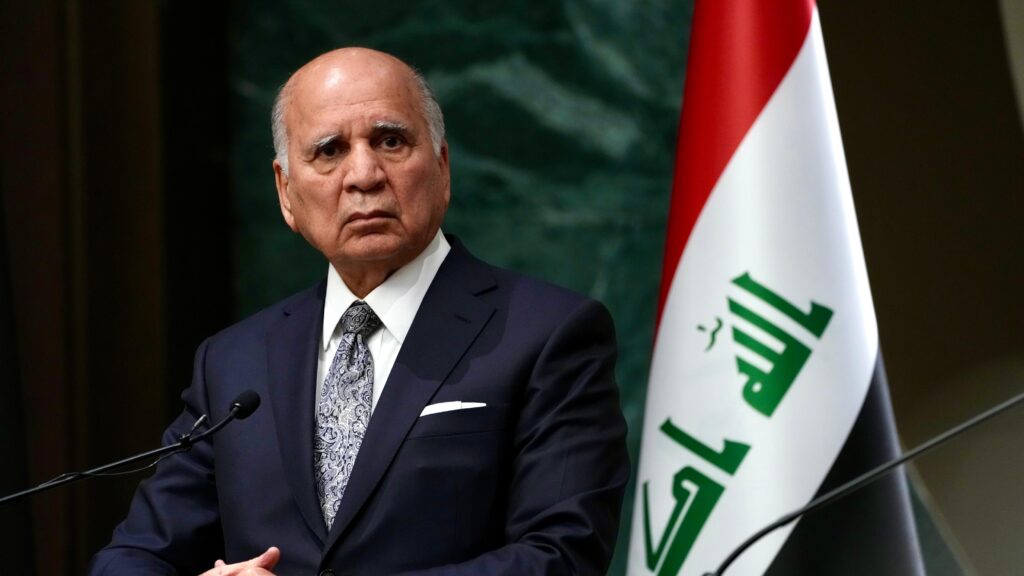Iraqi FM Fuad Hussein: 18,830 Nationals Repatriated from Al-Hol Camp
Iraqi FM Fuad Hussein announced 18,830 nationals have been repatriated from Syria's al-Hol camp to rehabilitation centers in Iraq. He emphasized the camp remains a security threat and called for international cooperation to resolve the crisis.

ERBIL (Kurdistan24) – Iraq’s Deputy Prime Minister and Foreign Minister Fuad Hussein announced on Friday that Baghdad has successfully repatriated 18,830 of its citizens from Syria’s al-Hol and Roj camps, underscoring Iraq’s firm commitment to coordinating with the international community to confront and eliminate terrorism.
Speaking at an international conference on the return of ISIS-affiliated families from the camps, held in New York on September 26, 2025, Hussein confirmed that all returnees are currently in Iraq’s rehabilitation centers, including the al-Amal camp. He stressed that Iraq remains committed to working closely with its international partners to address security threats and prevent terrorism from reemerging.
The minister reiterated Baghdad’s view that al-Hol camp in northeast Syria represents not only a humanitarian crisis but also a severe security and social threat to the region. He called for an urgent and balanced resolution to the crisis, warning that any delay in dismantling the camp risks prolonging instability.
Located south of the town of al-Hol in Hasakah province, the camp falls under the administration of the Democratic Autonomous Administration of North and East Syria (DAANES) and is guarded by the Syrian Democratic Forces (SDF). Despite continued efforts, the camp remains one of the most dangerous in Syria, where remnants of ISIS attempt to reorganize and carry out violent acts. The SDF, with coalition backing, regularly conducts security operations inside the camp to dismantle extremist cells.
At its peak in April 2019, al-Hol housed 74,000 detainees—mostly women and children from Syria and Iraq, along with nationals from other countries. The camp has long been a pressure point for the region, drawing repeated warnings from international organizations and security experts.
Iraq’s latest figures build upon successive waves of returns coordinated with DAANES and supported by the U.S.-led coalition. On August 28, 2025, 232 Iraqi families—comprising 850 individuals—left al-Hol as part of the voluntary repatriation program, marking the 29th organized convoy since the process began, and the 12th repatriation in 2025 alone.
Just a month earlier, in July, another 233 Iraqi families—around 812 individuals—were transferred from al-Hol to Iraq’s al-Jadaa camp. Similar efforts were carried out in May, when 358 families (1,307 individuals) were evacuated from DAANES-run camps, including 224 families linked to ISIS and 35 from Homs. That same month, DAANES handed over five German nationals—one woman and four children—to an official German delegation, while 40 ISIS fighters were extradited to Iraq for prosecution.
Such consecutive operations are designed to gradually reduce the camp’s population, relieve mounting humanitarian pressures, and remove a lingering security threat. Authorities in charge of the camp confirmed that all families undergo a thorough vetting process to ensure that no active ties to extremist activities remain before they are cleared to return home.
Hussein’s remarks in New York highlighted the dual approach of Iraq’s strategy: rehabilitating returnees through official centers while pushing internationally for the rapid resolution of the al-Hol crisis. By emphasizing that Iraq has already absorbed nearly 19,000 of its nationals, Baghdad seeks to demonstrate both capacity and determination in handling one of the most difficult legacies of the war against ISIS.
For regional and international actors, the minister’s warning serves as a reminder that the al-Hol issue is not a local problem but a global security file. As Hussein concluded, Iraq’s cooperation with international partners remains essential to ensuring that the remnants of ISIS do not find fertile ground to reemerge in Syria or beyond.